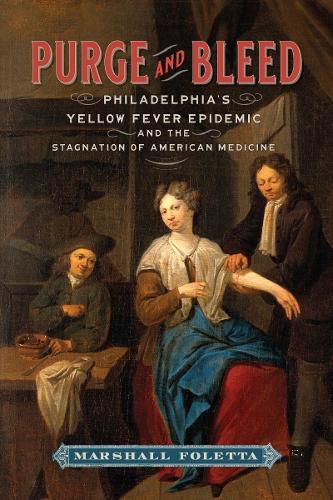Readings Newsletter
Become a Readings Member to make your shopping experience even easier.
Sign in or sign up for free!
You’re not far away from qualifying for FREE standard shipping within Australia
You’ve qualified for FREE standard shipping within Australia
The cart is loading…






Explaining the deadly stasis of American medicine in the nineteenth century
The 1793 yellow fever epidemic in Philadelphia was a shock to the system of American medicine - or it should have been. In the decades that followed the most infamous health crisis of the early republic, American doctors by and large failed to move beyond ancient ideas of disease and treatment. The contentiousness of Philadelphia's medical community, led by Benjamin Rush, prevented any meaningful advances in response to the outbreak.
Marshall Foletta investigates this peculiar dormancy over the course of the long nineteenth century and reveals how little had changed by the time of the 1832 cholera epidemic - leading, he argues, to exhaustion and despair among medical professionals and fatalism among the general public. Only at the end of the century did researchers make the all-important breakthroughs that produced an antidote to yellow fever. This is the story of how received wisdom became dangerously entrenched in the early United States, and the deadly consequences of scientific stagnation and intellectual inertia.
$9.00 standard shipping within Australia
FREE standard shipping within Australia for orders over $100.00
Express & International shipping calculated at checkout
Explaining the deadly stasis of American medicine in the nineteenth century
The 1793 yellow fever epidemic in Philadelphia was a shock to the system of American medicine - or it should have been. In the decades that followed the most infamous health crisis of the early republic, American doctors by and large failed to move beyond ancient ideas of disease and treatment. The contentiousness of Philadelphia's medical community, led by Benjamin Rush, prevented any meaningful advances in response to the outbreak.
Marshall Foletta investigates this peculiar dormancy over the course of the long nineteenth century and reveals how little had changed by the time of the 1832 cholera epidemic - leading, he argues, to exhaustion and despair among medical professionals and fatalism among the general public. Only at the end of the century did researchers make the all-important breakthroughs that produced an antidote to yellow fever. This is the story of how received wisdom became dangerously entrenched in the early United States, and the deadly consequences of scientific stagnation and intellectual inertia.